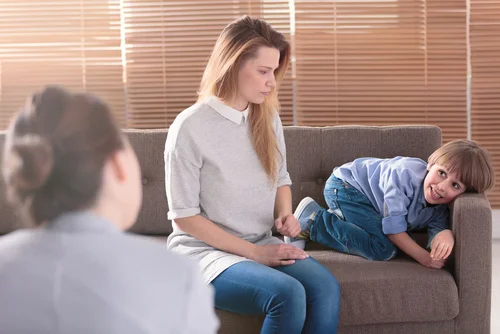What is Cognitive Behavioral Therapy (CBT)?
Cognitive Behavioral Therapy (CBT) is a popular therapeutic approach that focuses on practical steps to address, reduce symptoms of, and treat mental disorders and psychological distress.
According to a 2012 study published in the Journal of Cognitive Therapy and Research, CBT offers patients an opportunity to challenge limiting beliefs and modify harmful behavior patterns. This is because through CBT they become, “an active participant in a collaborative problem-solving process.”
Cognitive Behavioral Therapy can be used for children and teenagers for a multitude of mental disorders or psychological distress.
How Does Cognitive Behavioral Therapy Work?
At Oak Tree Development Center, pediatric social workers work not only with the child, but also with parents to solve pertinent issues at home or at school. The focus is on the child’s personal needs. Through positive encouragement and self-esteem building, child behavioral therapists promote success and progress.
Our staff ensures effective counseling by offering a safe environment to promote feelings of support and comfort. After getting to know the children and family, our pediatric social workers develop a treatment plan through cognitive behavioral therapy to guide positive changes.
Benefits of Cognitive Behavioral Therapy
Through CBT, children and teens learn to not accept a self-critical thought. Instead, they learn to look at their thoughts in a more realistic way. Behavioral therapists will teach your child to consider their actions before taking action, which may help prevent them from feeling worse in the long run.
The Royal College of Psychiatrists, which sets and raises UK psychiatry standards while supporting practicing psychiatrists, states that during cognitive behavioral therapy, therapists help identify combined patterns in thought, behavior, and action. Our pediatric social workers assist in helping change unhelpful thoughts and behaviors. They will create a plan for your child to practice on their own until their next therapy session.
In our Cognitive Behavioral Therapy sessions here in Chicago, clients learn practical skills they can use in their everyday lives. If a child or teen experiences additional behavioral symptoms, they can use the skills they learned in therapy to aid in changing the unwanted behavioral patterns. These life skills are beneficial for all areas of development and growth—tools your child, and your family as a whole, can continue to use for years to come.
Is cognitive behavioral therapy right for you?
Our cognitive behavioral therapists are here to help you and your family. They can be beneficial for children with various issues such as, ADHD, behavioral disorders, aggression, anger management, anxiety, depression, eating disorders, life events such as divorce, death or new siblings, OCD, separation disorder, tantrums and more.
If you’re interested in learning more or if cognitive behavioral therapy is right for your child or teen, please reach out today to see if we can help.
SOURCES:
Cognitive Behavioral Therapy (CBT). (n.d.). Retrieved January 26, 2019, from: https://www.rcpsych.ac.uk/mental-health/treatments-and-wellbeing/cognitive-behavioural-therapy-(cbt)
The Royal College of Psychiatrists, which supports practicing psychiatrists while setting and raising UK psychiatry standards.


